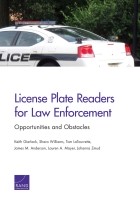| 来源类型 | Research Reports
|
| 规范类型 | 报告
|
| ISBN | 9780833087102
|
| 来源ID | RR-467-NIJ
|
| License Plate Readers for Law Enforcement: Opportunities and Obstacles |
| Keith Gierlack; Shara Williams; Tom LaTourrette; James M. Anderson; Lauren A. Mayer; Johanna Zmud
|
| 发表日期 | 2014
|
| 出版年 | 2014
|
| 页码 | 120
|
| 语种 | 英语
|
| 结论 |
License plate reader (LPR) systems, while initially used to detect stolen vehicles and plates, are increasingly being tapped for a variety of investigations.- Authorities can retrieve LPR data to determine vehicles in the vicinity of a crime scene.
- The system can provide photos of those vehicles to confirm suspect alibis.
- LPR data can be used to analyze crime patterns.
Many privacy advocates have challenged the practice of storing LPR data not associated with a specific crime.- Some police departments lack clear guidance on storing plate data, leaving privacy advocates to fear it can be kept and retrieved indefinitely.
- Some privacy advocates, departments, and lawmakers have moved to codify police procedures on recording these data; some have banned the technology's use outright.
LPR systems can be beneficial in providing assistance in any type of investigation, provided the necessary data are available to support the systems.- Systems with the most database access and longest retention policies are the most beneficial because they can provide the greatest number of alerts and the ability to retrieve LPR data over time across law enforcement activities.
- System maintenance and data storage can increase cost. If an agency's database can be made part of existing information technology infrastructure, its maintenance costs can be lessened.
|
| 摘要 |
- Estimate and secure necessary funding for the entire lifecycle of LPR technology.
- Ensure that sufficient infrastructure is in place to handle different types of data promptly and frequently.
- Develop policies for system data use, access, and storage.
- Integrate LPR systems into daily agency operations and learn from other agencies how to expand their use to more analytical operations.
- Develop model memoranda of understanding for agencies to share LPR data.
- Identify tradeoffs between privacy rights and law-enforcement uses.
|
| 主题 | Cyber and Data Sciences
; Data Mining
; Databases and Data Collection
; Analysis
; and Processing
; Information Privacy
; Law Enforcement
; Transportation Technology
|
| URL | https://www.rand.org/pubs/research_reports/RR467.html
|
| 来源智库 | RAND Corporation (United States)
|
| 资源类型 | 智库出版物
|
| 条目标识符 | http://119.78.100.153/handle/2XGU8XDN/107836
|
推荐引用方式
GB/T 7714 |
Keith Gierlack,Shara Williams,Tom LaTourrette,et al. License Plate Readers for Law Enforcement: Opportunities and Obstacles. 2014.
|
|
文件名:
|
x1495316370311.jpg
|
|
格式:
|
JPEG
|

|
文件名:
|
RAND_RR467.pdf
|
|
格式:
|
Adobe PDF
|
除非特别说明,本系统中所有内容都受版权保护,并保留所有权利。